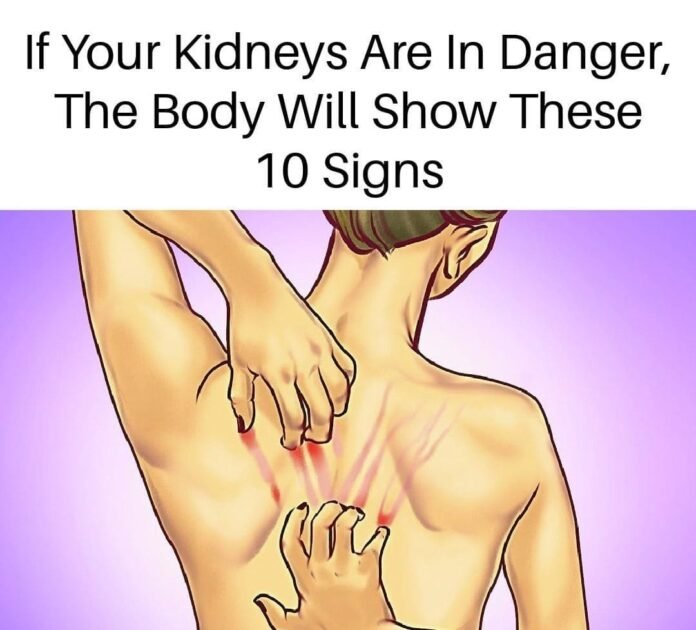If your kidneys are in danger, your body may start showing subtle signs that should not be ignored.
Here are 10 warning signs that could indicate your kidneys are struggling to function properly:
Fatigue and Weakness
One of the earliest signs of kidney dysfunction is constant fatigue. When your kidneys are not working effectively, they struggle to remove toxins and waste from your bloodstream.
This buildup of toxins can cause you to feel weak, tired, and have difficulty concentrating. Additionally, the kidneys produce a hormone called erythropoietin, which helps your body make red blood cells.
When kidney function declines, this hormone decreases, leading to anemia and further contributing to fatigue and weakness.
Swelling in Ankles, Feet, or Hands
Your kidneys are responsible for maintaining the body’s fluid balance by filtering out excess water and waste.
If they are not functioning correctly, your body can retain fluids, leading to swelling, especially in the ankles, feet, hands, or around the eyes.
This swelling, also known as edema, occurs because your kidneys are unable to remove the excess fluid and sodium from the body, causing it to accumulate in your tissues.
Changes in Urination Patterns
Kidney issues can manifest in noticeable changes in your urination patterns. You may experience frequent urination, particularly at night (nocturia), or find that you are urinating much less frequently.
Additionally, you may notice urine that is foamy, cloudy, or contains blood. Dark-colored urine or difficulty urinating can also be signs of kidney trouble.
Any significant changes in urination should be taken seriously and addressed with a healthcare professional.
Persistent Nausea and Vomiting
When kidneys fail to filter out toxins from the bloodstream, waste products can build up in your body.
This condition, known as uremia, can cause digestive symptoms like nausea, vomiting, and loss of appetite.
People with kidney disease often feel nauseous after eating or in the morning, and vomiting can lead to dehydration, which further strains kidney function.
Shortness of Breath
Kidney problems can affect your body’s ability to regulate fluid balance. When your kidneys fail to remove excess fluids, these fluids can accumulate in various parts of your body, including your lungs.
This fluid buildup in the lungs can lead to shortness of breath, a condition known as pulmonary edema.
Additionally, anemia caused by kidney disease can reduce oxygen-carrying capacity in your blood, making it harder for your body to get enough oxygen, leading to breathlessness.
Back or Side Pain
Pain in the lower back, just below the ribcage, or in the sides may indicate a kidney infection or kidney stones.
Kidney infections can cause dull, aching pain, while kidney stones may cause sharp, intense pain that comes in waves.
This pain may radiate to your abdomen or groin. If left untreated, kidney infections and stones can damage your kidneys, so it’s essential to seek medical attention if you’re experiencing persistent pain.
Dry, Itchy Skin
Healthy kidneys maintain the balance of essential minerals and nutrients in your body, such as calcium and phosphorus.
When your kidneys are not functioning properly, they can no longer regulate these minerals effectively, leading to imbalances that can cause dry and itchy skin.
In more severe cases, chronic kidney disease can lead to the accumulation of waste products in your blood, resulting in itching that does not respond to regular moisturizing treatments.
Difficulty Concentrating and Dizziness
When kidney function declines, the buildup of toxins and waste in the bloodstream can affect brain function.
This can lead to difficulty concentrating, memory issues, and a general feeling of mental fog. Anemia, which is common in kidney disease, can also reduce oxygen supply to the brain, leading to dizziness, lightheadedness, or confusion.
These cognitive changes may worsen over time if kidney function continues to decline.
High Blood Pressure
Your kidneys play a key role in regulating blood pressure by controlling the balance of sodium and water in your body.
When the kidneys are damaged, they can cause an increase in blood pressure, which in turn can further damage the blood vessels in the kidneys, leading to a dangerous cycle of declining kidney function.
High blood pressure is one of the leading causes of kidney disease, so it’s essential to monitor and control it to protect your kidney health.
Metallic Taste in Mouth and Bad Breath
A metallic taste in your mouth or ammonia-like breath can be a sign that your kidneys are not filtering waste properly.
When waste products accumulate in the blood, it can lead to uremia, which can cause a foul taste in your mouth and bad breath.
Many people also experience a loss of appetite or find that foods they once enjoyed now taste unpleasant. These symptoms can be an early indicator of declining kidney function and should not be ignored.
If you notice any of these warning signs, it’s crucial to consult a healthcare professional for evaluation and treatment. Early detection and intervention can help prevent further damage and maintain your kidney health.


